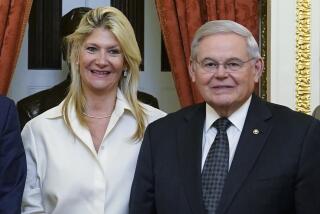Senators Link BCCI’s Miami Branch to Arms Trafficking : Scandal: Documents show bank sought buyers for missile-equipped jets owned by Argentina.
- Share via
WASHINGTON — The scandal-plagued Bank of Credit & Commerce International appears to have been involved in international arms-trafficking activity through a branch operation in Miami, Senate investigators said Friday.
Documents made public by Sen. Alan Cranston (D-Calif.), a member of a Foreign Relations subcommittee that is examining the bank’s activities, show that BCCI sought to line up a third-country buyer for 22 missile-equipped French-made jets owned by the Argentine air force.
The subcommittee on terrorism, narcotics and international operations also heard testimony that BCCI had mysteriously persuaded Peruvian officials to put $250 million in government reserves into numbered bank accounts in BCCI’s Panama branch.
Members of an investigative committee of the Peruvian Parliament told U.S. senators that they suspect some officials of Peru’s central bank and former President Alan Garcia may have received payoffs in return for arranging the deposits.
BCCI, which was based in Luxembourg and had operations in 69 countries, was seized on July 5 in what is believed to be the biggest banking scandal in history. In the United States alone, the bank’s activities are being investigated by the Federal Reserve Board, the Justice Department and Manhattan Dist. Atty. Robert M. Morgenthau, who brought a massive indictment against the institution last week.
President Bush, in his first public remarks on the growing scandal, called it “a very serious matter” that is going to hurt “a lot of people.” He added, however, that some officials could be unfairly tarnished by the scandal.
“This bank apparently was doing very bad things, but I have seen motives assigned to people that I am not prepared to accept at this point,” he said at a White House news conference. Bush said he has full confidence in Robert M. Gates, his nominee to head the CIA, although “some (critics) are trying to use this matter against” him.
The CIA, meanwhile, confirmed reports that it had used BCCI to transfer substantial funds around the world. Deputy CIA Director Richard Kerr told a forum of high school students in Washington that “we used it as anybody would use a bank . . . to move money.”
Maintaining that there was nothing illegal about the fund transfers, Kerr said his agency also had fed intelligence about the bank’s criminal activities in narcotics and money-laundering to other federal agencies. Retiring CIA Director William H. Webster said last month that he was reviewing any past contacts that the agency may have had with BCCI.
In New York, a federal bankruptcy judge temporarily froze most U.S. legal action against BCCI on Friday in an attempt to protect the bank’s assets and ensure that they are fairly divided among creditors worldwide.
The action came in response to a request by court-appointed foreign representatives of BCCI to defer action against the bank.
Federal Judge James Garrity of the U.S. Bankruptcy Court for the Southern District of New York said creditors would suffer serious harm unless the order was granted.
In Britain, former BCCI officials said Friday that the British MI-5 intelligence service knew years ago that BCCI held terrorist accounts, which it monitored so that it could track arms deals. Palestinian terrorist Abu Nidal maintained a $50-million account at the bank’s London branch, they said.
On the purported Argentine jet sale through BCCI, Cranston introduced 41 pages of highly technical documents that the subcommittee had subpoenaed from BCCI’s Miami branch. One page said that the Argentine air force “will pack and crate logistic support material and store it . . . for picking up (by the) customer country.”
However, Raul Alconada Sempe, a former minister of defense in Argentina, told the subcommittee that he is certain such a sale was never consummated. He said that such a transaction was never considered or approved by a committee of Cabinet members, as required by law.
Sen. John Kerry (D-Mass.), the subcommittee chairman, said the documents “seem to be indicative of a transaction being brokered by the bank.”
But Sempe, referring to BCCI, said that “sometimes middlemen just crop up . . . to try to find a buyer” even without authorization of an arms sale.
Fernando Olivera, a member of the Peruvian House of Deputies and chairman of that body’s investigating committee, said there is evidence that Peru used BCCI to sell 14 French Mirage jets to Iraq in August, 1986, when Garcia was president.
But the evidence is less than firm, he said, because BCCI apparently falsified records to conceal the transaction. In addition, the bank-secrecy laws of some foreign nations involved in such deals are written “to favor the criminals” more than the investigators, Olivera testified.
He said that Peruvian investigators still are trying to understand “all of the irregularities and suspicious behavior” surrounding the Central Bank’s deposit of $250 million in reserves with BCCI in Panama.
More to Read
Sign up for Essential California
The most important California stories and recommendations in your inbox every morning.
You may occasionally receive promotional content from the Los Angeles Times.












